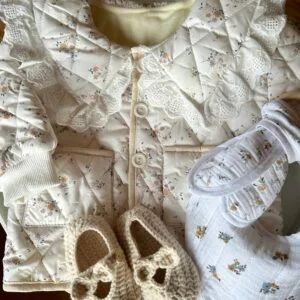Childcare is a major pain for many parents in France. Choosing the right childcare for your little one can be a real headache. How do you know if your child will like this environment? Do the proposed schedules match your needs? How much will it cost? There are many options, and we will help you weigh them, ask the right questions and make a decision that is right for your family.
Where to start?
There are advantages and disadvantages to each type of child care. Your choice will depend on your specific needs (for example, whether you need to cover particular work hours) and what you think is best for your little one.

Types of childcare in France
Approved childminder
Approved childminders are supervised by a structure that ensures the quality of their work. They welcome children into their home, generally in small groups, which can be a reassuring environment for a shy child or a child with special needs. They work for themselves, which means that they manage their social security contributions. You can pay part or all of their costs using aid such as the PAJE (Prestation d'accueil du jeune enfant).
Most offer very flexible hours and can arrange pick-up and drop-off for children at school or nursery. You can also use your free childcare hours if you are entitled to them. However, in the event of illness or holidays, you will have to find an alternative solution sometimes at the last minute. Depending on their organisation, your child may not benefit from the same variety of activities as in nursery.
Crib
Most daycare centers cover standard working hours. If the daycare center is run by your company or the municipality, the fees may be more affordable. You can use your free childcare hours if you are eligible and benefit from other assistance such as CESU checks or the tax credit for childcare costs.
In a nursery, your child has the opportunity to socialise with many other children and take part in a wide range of activities. However, nurseries are often more expensive than childminders and you may have to pay a registration fee or continue to pay even if your child is absent. If you work outside of normal hours, this type of childcare may not be suitable for you.
Nanny at home
A nanny may or may not live in your home, but they look after your little one in your home. If they are registered, you may be able to cover some of their costs with benefits such as CESU vouchers. A relationship with your child can be truly rewarding, offering great individual flexibility to meet your childcare needs. However, as they work for you, you will need to manage their social security contributions and pension. In the event of illness or holidays, you will also need to find a back-up solution.
Au pair
An au pair usually lives in your home and can provide around 30 hours of childcare per week. As a family member, you don't have to worry about social security contributions or taxes. They are paid much less than a nanny. However, in case of illness or vacation, you will need to find an alternative solution. You will need to provide them with a room and food. Au pairs often only stay for a year or less, which can be difficult if your child becomes attached to them. You cannot use CESU checks or other aid for the payer.
Kindergarten
Preschools are often attached to a primary school or crèche and are usually run by the local authority. They are mostly free. Operating like a school, they are a great introduction to primary school for your little one. You can also use your free childcare hours. However, this type of childcare is only for children aged 3 to 5, and you will need to find a solution for school holidays.
It is also possible to think about other options such as kindergartens or day nurseries where you can use your free hours. They usually operate in three-hour sessions in the morning or afternoon, but only during school terms, so a childcare solution for the holidays will be necessary.
Some childcare is still available in multi-reception centres, but unfortunately not as much as it was a few years ago. You could also consider calling on friends or family, but there are rules to follow, and it is worth thinking about the impact on your overall relationship.
How to choose between these options?
Start by defining your needs. What are the hours you need to cover? What location would be ideal (near home? Near work?) What is the ideal setting for your child (large groups, family environment)? Then you can narrow down your options.
Research and visits
Do some research into what’s available in your area, such as on government websites or platforms like MyChild.com. Ask other parents you know, as well as friends and family, for recommendations. Local childminders sometimes post ads in libraries or community centres and on social media. Once you’ve identified a few options, visit these places (or interview a nanny or au pair).
Be sure to ask about costs (including whether you can use your free hours etc), their experience, how well they handle and interact with your child, how they deal with any issues that may arise, their approach to discipline, what activities your little one will be able to do, who exactly will be looking after them, and any practicalities around naps, meals and potty training.
Checks and references
If the provider is registered, check their rating. For a childminder, nanny or au pair, ask for references. It is important to start looking for childcare options as early as possible, as many daycares and childminders are booked up months or even years in advance.
Childcare: Financial assistance available
Yes, the child care will absorb part of your income for a certain time, but there is assistance available to support you. < p>In France, you can benefit from several schemes to reduce the cost of child care :
- PAJE (Young Child Care Benefit) : This aid is paid to parents to help them finance the care of their child under 6 years old, whether in a nursery, with an approved childminder or with a nanny at home.
- Pre-financed CESU checks : Some companies offer these checks to their employees, who can use them to pay part of the cost of child care.
- Free childcare hours : When your child reaches the age of 2, you can benefit from certain hours of free childcare, depending on your situation.
- The tax credit for child care expenses : You can get some of your child care costs back as a tax credit, which can help reduce the cost.
- Housing assistance (APL) : If you are eligible, APL can also be used to pay part of your childcare costs.
You can find more details about these aids on the government website or on platforms like CAF.fr. Remember that it is your choice, and you must choose what suits your child best. You can always change your option if it does not work.
Conclusion: Making the Right Child Care Choice
The choice of the child care is an important decision that will have a significant impact on your little one’s well-being and the organization of your family life. By taking the time to assess your needs, doing thorough research, and exploring the different options available, you can find the solution that best suits your family. Remember, you are not alone in this process; there are many resources available to help you make the right choice and take advantage of the financial assistance available.
Finally, the child care should not be a source of stress. By balancing your professional needs, your budget and your child's well-being, you can create an environment in which your child will thrive while having the peace of mind you are looking for. Whether you choose a daycare, a childminder, a nanny or an au pair, the key is to find what works best for your family.
If you live in France, you can read about:
The Awakening artistic and cultural young children.
Our special Advent calendar:
You can also consult our advent calendar special designed especially for new mothers.

























